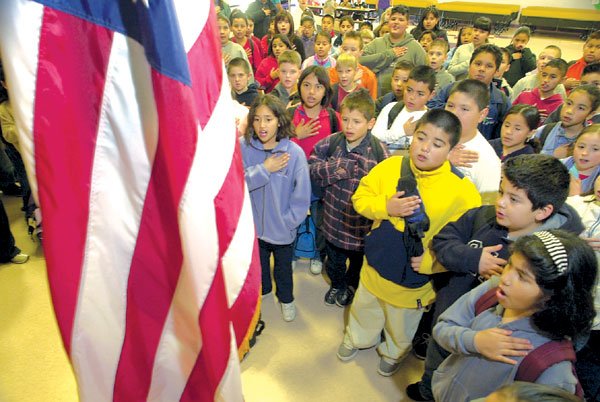GILROY
– On March 10, Gilroy public school students will need to be a
little less patriotic, in order to keep their district out of
trouble with the law.
The 9th U.S. Circuit Court of Appeals reaffirmed Monday that the
Pledge of Allegiance, due to Congress’ 1954 addition of the
phrase
”
under God,
”
is an unconstitutional endorsement of religion when recited in
public schools.
GILROY – On March 10, Gilroy public school students will need to be a little less patriotic, in order to keep their district out of trouble with the law.
The 9th U.S. Circuit Court of Appeals reaffirmed Monday that the Pledge of Allegiance, due to Congress’ 1954 addition of the phrase “under God,” is an unconstitutional endorsement of religion when recited in public schools.
On Monday, public schools in the nine western states the court covers could be barred from saying the patriotic pledge, unless appellate judge Alfred T. Goodwin stays his court’s decision to allow for further appeal.
“If saying the pledge is unlawful on Monday, of course we will comply,” Gilroy Unified School District Superintendent Edwin Diaz said. “Right now I need to gather more information and get further clarification on the situation.”
Diaz said he would confer with district lawyers and the county Office of Education over the next few days.
The federal court’s decision brought on a groundswell of controversy across the nation when it was handed down last summer. It puts communities like Gilroy in the precarious position where children at one school – for instance St. Mary Catholic school – can recite the pledge as usual, but doing so at another just blocks away – like public school El Roble Elementary – could land it in federal court.
“I don’t understand why we can’t say it,” said Benjamin Martinez, an 8-year-old El Roble second-grader. “I feel like God is just protecting us when you say that.”
Adults are befuddled, too.
“This is a just another sign of how the system is letting our kids down,” said Leann Brazwell, a parent of two El Roble students. “If someone doesn’t want to participate in the pledge, they can just remain seated. We have one man’s complaint causing problems for every family now.”
In the bitterly divisive case last summer, the 9th U.S. Circuit Court of Appeals initially ruled that use of the pledge violates the Constitution because it includes the words “under God,” which amounts to a government endorsement of religion.
The case was brought against the Elk Grove Unified School District, the U.S. Congress and others by Michael A. Newdow. Newdow is a Sacramento atheist who has a daughter in the Elk Grove district.
On Friday, Judge Goodwin amended the previous court decision, narrowing the ruling to apply only in public schools and not across the board, 9th Circuit spokesman David Madden said.
The amendment opens the door to further appeals. Madden said the judge may decide as early as today to issue another stay.
Despite the potential delay, Gilroy Unified School District School Board President Jim Rogers said he would meet with Diaz today.
“Edwin needs to make an operational decree, and we need to have staff check with attorneys to see what our options are,” Rogers said. “When we get a legal opinion, we can see what the board has to say.”
The matter is not on the school board’s agenda for its regular monthly meeting Thursday. It meets next on March 20.
At Antonio Del Buono Elementary School, Principal Pat Midtgaard has no plans to change her students’ “morning message” ritual, unless she gets direction from Diaz.
Each morning, one grade level of ADB students gathers in the school’s multipurpose room for flag salute, a patriotic song and other activities, such as birthday recognition.
California law requires schools to conduct a patriotic observance at the beginning of each school day.
“If we are told to stop saying the pledge, I would certainly not cancel morning message and will do a patriotic song every day,” Midtgaard said.
Already, ADB allows children to stand in respectful silence during the 31-word recitation if their religious beliefs forbid them from pledging allegiance. Midtgaard, who attends the morning message, said if the federal court banned the district from saying the Pledge of Allegiance, she would simply explain to the students that the law of the land supersedes local rules.
“I won’t have kids do the pledge out of defiance. What kind of a message would that send?” Midtgaard said.
The federal court’s ruling apparently allows recitation of the phrase if the words “under God” are not used. However, Elk Grove Unified School District, a defendant in the suit, said it would not consider reciting the pledge without the “under God” phrase.
Rogers remembers growing up saying the pledge without that now-controversial wording.
“I could live with saying the pledge without the phrase. That’s how I grew up,” Rogers said. “I think we have bigger and tougher problems to focus on than this, however, because of the budget situation.”
The case does not figure to end at the 9th Circuit court. Elk Grove says it will ask the U.S. Supreme Court to overrule the appeals court.
Also, Attorney General John Ashcroft has said the Justice Department would “spare no effort to preserve the rights of all our citizens to pledge their allegiance to the American flag.”
“We will defend the ability of Americans to declare their patriotism through the time-honored tradition of voluntarily reciting the pledge,” Ashcroft added.
Associated Press reports contributed to this story.













